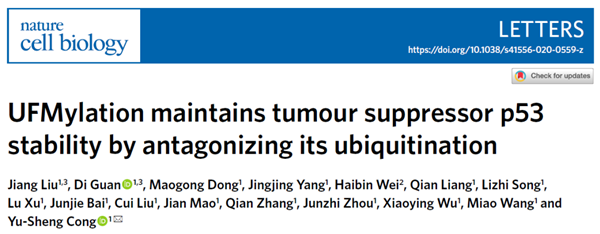Home> News
Chinese research group identifies UFMylation as promising therapeutic target in cancer
Updated: 2020-08-21

Research paper entitled UFMylation maintains tumor suppressor p53 stability by antagonizing its ubiquitination is published in the journal Nature Cell Biology on Aug 17. [Photo/WeChat account of BSC]
A research team from the Key Laboratory of Aging and Cancer Biology in East China's Zhejiang province published its research results in the journal Nature Cell Biology on Aug 17, according to a statement on the public WeChat account of the Biophysical Society of China or BSC, identifying UFMylation as a crucial post-translational modification for maintenance of p53 stability and tumor-suppressive functions -- and pointing to UFMylation as a promising therapeutic target in cancer.
Scientists say p53 is the most intensively studied tumor suppressor and that the regulation of p53 homeostasis is essential for its tumor-suppressive functions.
Although p53 is regulated by an array of post-translational modifications, both during normal homeostasis and in stress-induced responses, just how p53 maintains its homeostasis remains unclear.
UFMylation is a recently identified ubiquitin-like modification with essential biological functions. Deficiency in this modification leads to embryonic lethality in mice and disease in humans.
The report published by the team found that p53 can be covalently modified by UFM1 and that this modification stabilizes p53 by antagonizing its ubiquitination and proteasome degradation. Mechanistically, UFL1, the UFM1 ligase6, competes with MDM2 to bind to p53 for its stabilization. Depletion of UFL1 or DDRGK1, the critical regulator of UFMylation, decreases p53 stability and in turn promotes cell growth and tumor formation in vivo. Clinically, UFL1 and DDRGK1 expressions are down regulated and positively correlated with levels of p53 in a high percentage of renal cell carcinomas.
